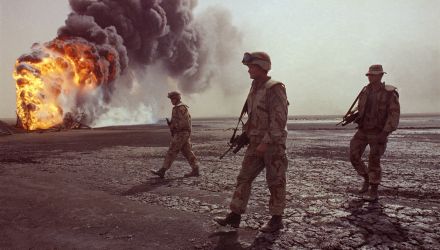BEIRUT -- There has been much talk in the United States since Sept. 11, 2001 about the importance of "connecting the dots" in analyzing global intelligence information, meaning that different bits of information from varied sources should be linked to each other to provide a full picture of an actual or imminent security threat that is not apparent from a single act or source of intelligence.
The same process of connecting the dots is useful for any American interested in learning why the United States now finds itself in the unenviable situation of: a) fighting two wars in the greater Middle East region with limited success; b) pushing very hard for a resumption of Arab-Israeli peace negotiations with equally elusive achievements; c) steadily moving towards a more strident confrontation with Iran; and, d) seeing Arab public perception of the United States drop precipitously in the past year.
Here are four dots that thoughtful Americans should ponder carefully, while they connect them to learn why the United States in much of the world has become the beacon of both democracy and freedom at home, but dishonesty abroad. Three of these are moves in the Congress (mainly the House of Representatives) to support an Israeli military attack against Iran, to suspend and review American military assistance to Lebanon for fear that US weapons could be used to fight Israel, and, to review financial support of the UN agency UNRWA that provides basic health, food and education needs for Palestinian refugees because of alleged anti-Israeli actions among UNRWA staff or facilities.
The fourth dot is the annual public opinion poll of four Arab countries released last week by the University of Maryland (Dr. Shibley Telhami) and Zogby International, showing that Arab views of President Barack Obama and the United States have plunged sharply in the past year. This year only 16 percent of Arabs are hopeful about US policy in the Middle East -- compared to a healthy 51 percent just a year ago. More significantly, a whopping 61 percent of Arabs polled said that US policy on Israel-Palestine was the most important reason for their disappointment with the US; Arab support for Iran's nuclear rights is massive and keeps increasing; and Arabs see the United States and Israel as their main threat.
The three dynamics in the House of Representatives reflect the core problem with American foreign policy in the Middle East as seen through Arab eyes: Washington's severe tilt to pro-Israeli positions is so intense that it wipes out the prospects of the United States being a truly impartial mediator in peace negotiations, and hurts many other American interests in the region. These three congressional initiatives will probably not be voted into law, but that is beside the point. In domestic American political terms, the point is that any public discussion of Arab-Israeli or other Middle Eastern issues must be framed squarely, repeatedly, and only through the lens of what rightwing Israelis and other Zionists feel is in their interest. Everything else -- Arab rights, American strategic interests, the vulnerability of young American troops in the region, the stability of Arab regimes -- is secondary.
So the message from political America is that Israeli sensitivities, security and, in some instances, colonization policies, are the criterion by which all American actions in the Middle East are measured. American foreign policy thus becomes a proxy for Zionist fears and Israeli militarism. So Arabs get American military aid but cannot use it to defend themselves against Israeli threats or aggression. UN agencies that provide humanitarian aid to Palestinians should be emasculated in order for the Palestinian refugee issue to melt away miraculously. All support should be provided to Israel to attack Iran. If any American politician resists these rules, they either quickly conform or are booted out of office.
It took the Arab world about two generations to wake up to the reality that noble and widely-operative American principles of fair play, even-handedness, justice and equality are almost totally sidelined when Arab-Israeli issues are concerned.
Three principal reactions to this can be seen to date, and they continue to develop: Islamist and resistance movements continue to strengthen and act throughout the region; public opinion remains deeply skeptical and critical of US policy; and, America's once firm allies (like Iran and Turkey) are carving out very different, independent postures for themselves. This leaves the United States anchored in the region with only a wildly militaristic and increasingly isolated and even delegitimized Israeli government, along with Arab governments that are steadily finding themselves more distant from their own people's sentiments and values.
There are enough dots to connect here to keep people busy in Washington for some months, if anyone there dares or cares to deal with the realities of the Middle East, as opposed only to domestic American power politics.
Rami G. Khouri is Editor-at-large of The Daily Star, and Director of the Issam Fares Institute for Public Policy and International Affairs at the American University of Beirut, in Beirut, Lebanon.
Khouri, Rami. “Washington Has Dots to Connect.” Agence Global, August 16, 2010





